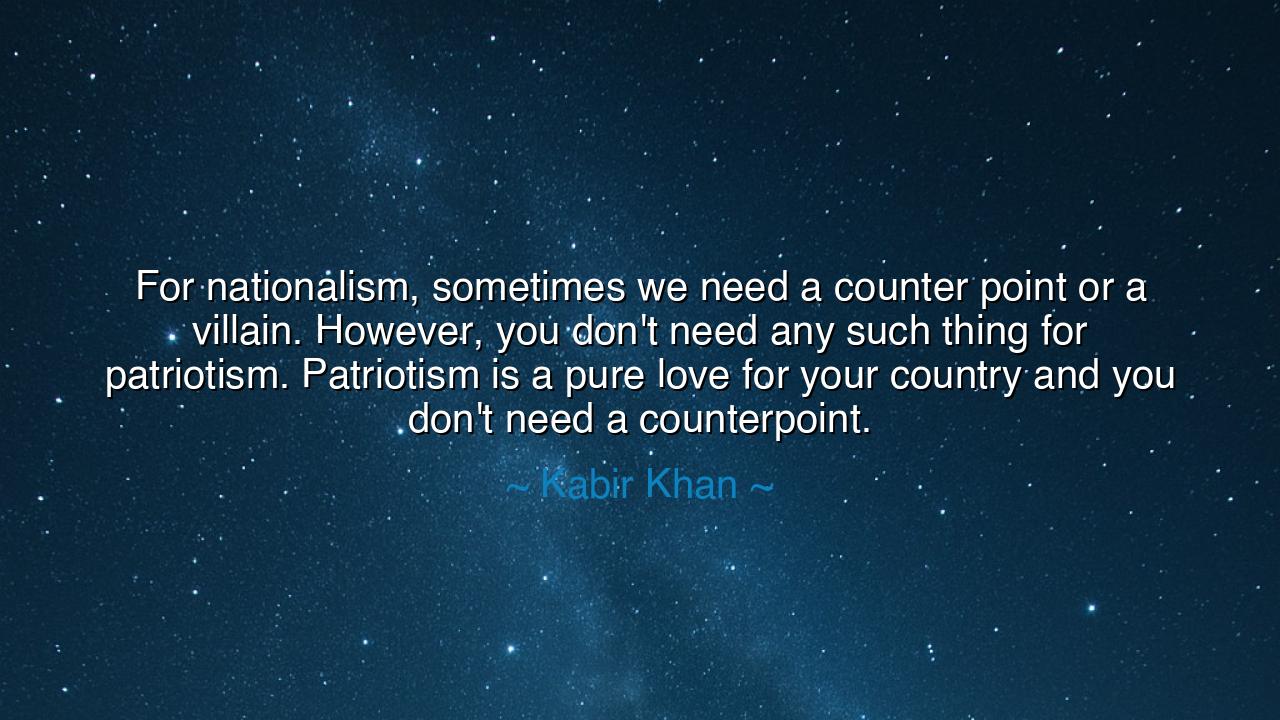
For nationalism, sometimes we need a counter point or a villain.
For nationalism, sometimes we need a counter point or a villain. However, you don't need any such thing for patriotism. Patriotism is a pure love for your country and you don't need a counterpoint.






The filmmaker and thinker Kabir Khan once reflected: “For nationalism, sometimes we need a counter point or a villain. However, you don't need any such thing for patriotism. Patriotism is a pure love for your country and you don't need a counterpoint.” In these words lies a profound meditation on the distinction between two forces often confused: nationalism and patriotism. Khan reminds us that nationalism often defines itself by opposition, by the identification of “the other,” whereas patriotism arises from a direct, unadulterated love for one’s homeland, untainted by comparison or enmity.
In the wisdom of the ancients, the love of the polis or state was always intertwined with virtue, courage, and moral purpose. Aristotle taught that civic loyalty was most noble when guided by reason, justice, and a commitment to the common good—not by fear or hatred of outsiders. Khan’s observation echoes this lesson: patriotism is a self-contained devotion, a warm flame that does not require shadows to define its light. It does not seek enemies, nor does it grow from division; it thrives in the affirmation of what is good and just within one’s nation.
History offers vivid illustrations of this distinction. Consider George Washington, who led a young America not by fostering hatred of Britain after independence, but by cultivating a sense of responsibility, unity, and civic pride. His patriotism did not require a villain to exist; it was sustained by a love of liberty, community, and the promise of the new republic. In contrast, nationalist movements often find identity in opposition, constructing enemies to galvanize loyalty. Khan’s words caution us to recognize that the moral purity of patriotism is found in love, not in fear or conflict.
The meaning of Khan’s reflection reaches deeply into both civic and moral life. Nationalism is reactive; it thrives on the other, on what the nation is not. Patriotism, by contrast, is proactive; it seeks the good, celebrates the strengths, and nurtures the welfare of the people without demanding a villain to define its purpose. True patriotism is measured not by who is opposed, but by how the citizen contributes to the flourishing of the homeland, upholding values, justice, and community.
Consider the story of Nelson Mandela. His patriotism for South Africa did not rely on demonizing white citizens, nor did it seek revenge after decades of oppression. Instead, it was a pure love of country expressed through reconciliation, reform, and nation-building. By embracing justice and equality as guiding principles, Mandela exemplified the patriotism Khan describes—a devotion that needs no counterpoint, no villain, only a commitment to the greater good of the nation and its people.
Khan’s words also illuminate the danger of confusing nationalism with patriotism. When loyalty to one’s country is expressed through animosity toward others, the moral essence of devotion is lost. Patriotism, he reminds us, is self-sufficient; it is nourished by pride, responsibility, and service, rather than by fear, resentment, or the vilification of those beyond its borders. To love one’s homeland rightly is to elevate it through constructive action, not to define it by opposition.
The lesson for all generations is clear: cultivate a love for your nation that is pure, proactive, and principled. Seek to build, to nurture, and to uphold the values that make your country worthy of devotion. Reject the temptation to define loyalty by contrast, and avoid the corruption of patriotism into antagonistic nationalism. True patriotism is an inward light, requiring no shadows, no villains, and no external measure of worth.
Practically, this calls each citizen to engage in service, civic responsibility, and moral reflection. Participate in community-building, support just institutions, and foster dialogue rather than division. Celebrate your country’s achievements while addressing its shortcomings with integrity. In doing so, one embodies Khan’s insight: patriotism is pure love for one’s country, unshakable, untainted by enmity, and fully expressed in deeds that strengthen the nation and its people.






AAdministratorAdministrator
Welcome, honored guests. Please leave a comment, we will respond soon